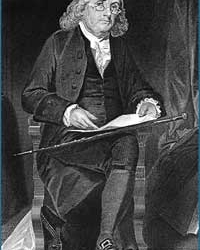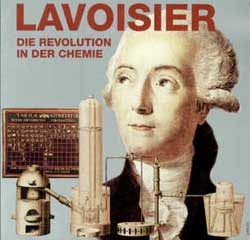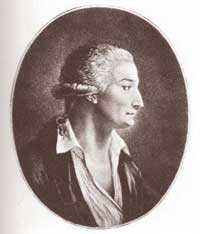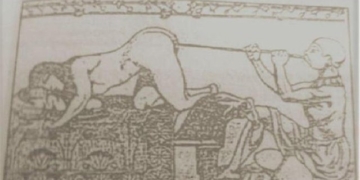Dr. Bùi Thanh Duyên has successfully decoded over 100,000 gene codes to detect early risks of hereditary diseases, enabling many individuals to plan appropriate monitoring and screening.
Four years ago, at the peak of her career, Dr. Bùi Thanh Duyên and her husband, Cao Anh Tuấn, a Computer Science PhD from Cornell University working in big data at Google, decided to return to Vietnam.
Many told her that it would be difficult to conduct high-tech research or have modern laboratories up to international standards in Vietnam, like those in the U.S. However, she assured them that she believed in her decision to return to her homeland.
She believes that gene research projects are mainly focused on Asian populations, making her return essential for delving deeper into this field. Additionally, her research projects are directed toward Asian individuals, which further justifies her decision to come back. This return will allow her to deepen her studies in genetics.
Building a Gene Map for Vietnamese People
The gene decoding company Genetica was established with the determination to create a gene map for Vietnamese individuals. Dr. Duyên takes on the role of lead researcher while her husband Tuấn manages technology and operations for their “brainchild.”
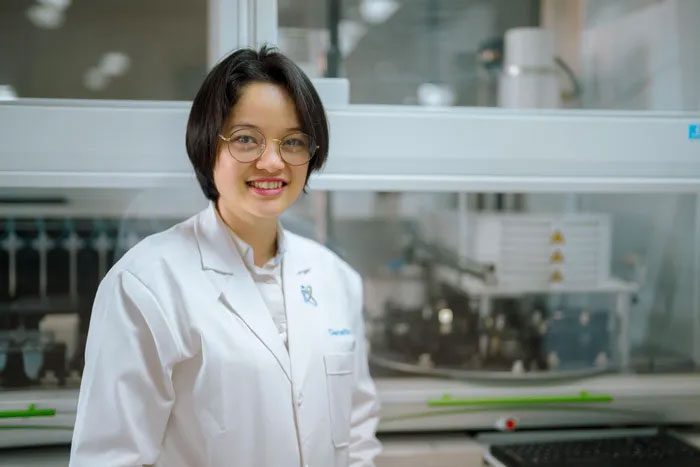
Dr. Bùi Thanh Duyên, Scientific Director and Founder of Genetica.
Initially, Dr. Duyên’s research team focused on decoding genes related to cancer patients, later expanding to analyze the genes of children to provide nutritional advice or help families identify their children’s strengths and weaknesses for effective care.
“With just a few drops of saliva, we can extract DNA to decode genes. From these genetic parameters, we can provide useful information such as risks of vitamin deficiency, diabetes, or cardiovascular diseases,” she said, adding that after 12 years, they have successfully decoded over 100,000 human gene codes.
Recently, she and her colleagues at Genetica have been researching variants in children with autism in collaboration with Huế Central Hospital, studying the effects of medication in treating lipid disorders, heart diseases, and several other research projects involving Vietnamese individuals. The results are in preliminary stages but show significant potential and impact on many lives. The team will soon publish these findings upon completion.
As a successful woman in scientific research, she acknowledges her good fortune in having a mother who sacrificed a lot to care for her family. “Without my mother supporting me, I couldn’t focus on research. When conducting research, one often lives in the laboratory, absorbed in experiments and meticulously observing reactions, making it difficult to step away,” the doctor shared.
To have more time for her family, she strives to maintain a habit of working on schedule. She feels happy that her work impacts many lives. She hopes these contributions can improve even the smallest aspects of life. In science, especially genetics, there are still countless things to explore, “I fear that even a lifetime may not be enough to uncover everything I want to discover.”
Once Sneaked Away from Parents to Pursue Her Passion
Dr. Bùi Thanh Duyên was born in 1987 and grew up in Hà Giang. In 2005, she passed the entrance exam for the Finance and Banking program at the National Economics University with 25 points. She was also directly recruited into the Life Sciences program at the University of Natural Sciences.
During her first semester in university, she attended one school in the morning and raced to another in the afternoon. During lunch, the student had only about an hour to eat and travel between the two locations.
After much effort, in 2009, the girl from Hà Giang graduated with honors from both universities. A year after graduation, Bùi Thanh Duyên received a scholarship to pursue her PhD at Cornell University in the U.S. The scholarship, valued at $54,000 for the first two years, changed her life and opened up a completely new research direction for her.
“At that time, the field of genetics in Vietnam was still very new. While many friends studied popular fields like economics or information technology, I chose a field that everyone said had no future. Many know that decoding genes based on DNA helps determine ancestry, but few realize that it can also help us understand our health, nutritional needs, immunity, and predict the risk of hereditary diseases like cancer and cardiovascular issues,” she explained.
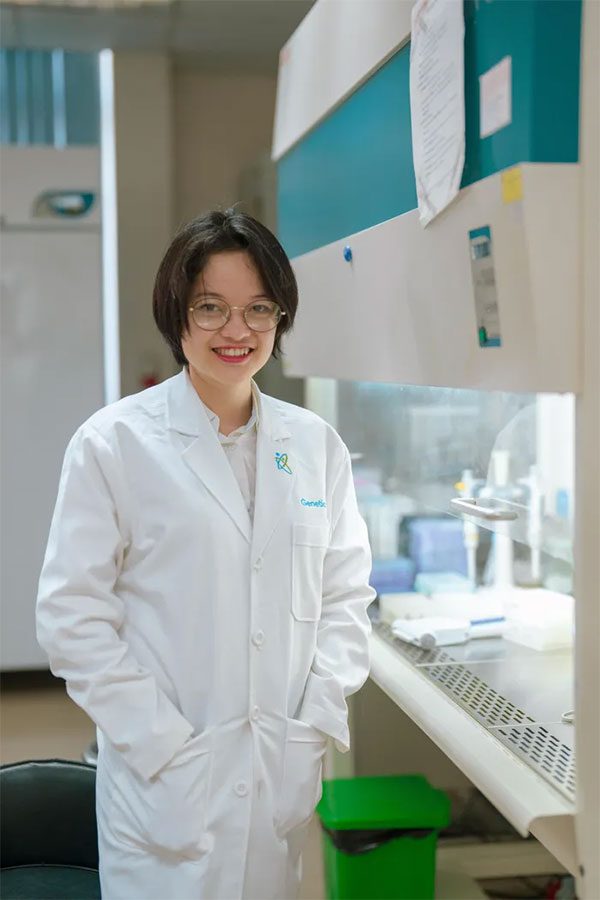
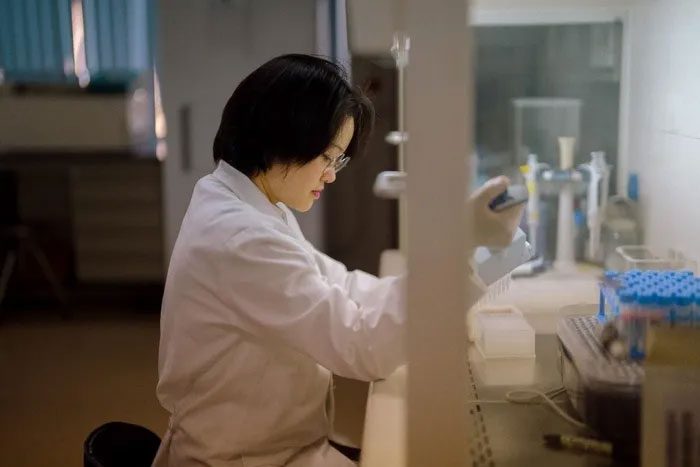
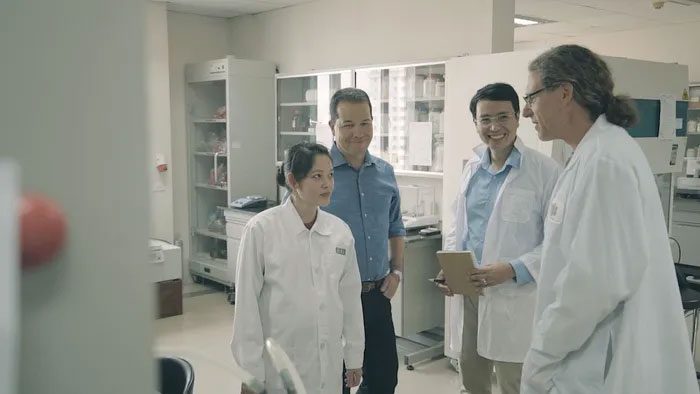
Dr. Bùi Thanh Duyên in the Genetica gene decoding lab.
At Cornell University, Dr. Duyên focused on genetic research, particularly genes related to cancer, specifically the interaction between PMS1-MLH1—two genes associated with colorectal and colon cancer. When an individual carries a pathogenic mutation in either of these genes, their likelihood of developing cancer in the future ranges from 40% to 60%, and even higher if they smoke or drink alcohol.
During her six years as a PhD student, she discovered mutations in genes that cause cells to malfunction in their DNA repair mechanisms, leading to rapid growth in harsh environments. This discovery helps explain why some cancer cells can survive chemotherapy.
Mutated genes related to cancer were also a focus of her research while working at the School of Medicine at the University of California (UCSF) after completing her PhD in 2016. This research helps explain the underlying causes of mutations and the core reasons for cancer development.
In 2016, after completing her PhD in Genetics and Molecular Biology, she returned to conduct research at the School of Medicine at the University of California. She gained practical experience with significant findings, such as identifying mutations in genes that disrupt DNA repair mechanisms leading to aggressive cancer growth. However, she also faced numerous failures in her experiments. Each time she failed, she was fortunate to meet leading scientists worldwide, who inspired and empowered her to persist in her research.
In the future, the female doctor hopes that gene decoding technology will become more accessible to Asians in general and Vietnamese people in particular. Everyone will benefit from an internationally standardized gene testing service that is accurate and highly secure, requiring only a one-time test in a lifetime, with results accepted in healthcare systems worldwide.








































